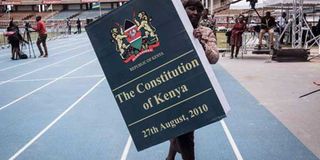Coronavirus: If you act the goat, you can lose your privacy rights

The Constitution of Kenya only protects the right not to have personal information “unnecessarily” revealed. PHOTO | YASUYOSHI CHIBA | AFP
What you need to know:
- Disclosures can be made when the information is already in the public domain or is a fair comment on a matter of public interest.
- If it’s necessary to violate your right to privacy to protect the public interest, it will be done, with no apologies.
This is a sequel to my article “Why we don’t reveal the names of people infected with coronavirus” published last Friday.
The article provoked many readers to ask if the Nation practises what the public editor preaches.
“Your paper has disclosed names of Catholic priest Fr Francis Oduor and Kilifi Deputy Governor Gideon Saburi, and you continue to refer to Fr Oduor as a ‘reckless priest’ (‘59 people in contact with reckless Siaya priest put on self-quarantine’ — Daily Nation, March 24, 2020),” says Wairimu Gitau of Nairobi.
“So why this discrepancy between what you say is the law and what your esteemed paper is doing?”
Ann Margaret Wangui is equally concerned: “It’s said that no mention of names of those who are infected. So why is the Father being mentioned?”
And the owner of telephone number 0721 428 XXX, who texted without giving his or her name, said my article does not make sense: “What you’re explaining doesn’t hold water because you (the Nation) have stigmatised the Catholic priest. His name has been in the media every day. You’re saying he’s reckless. How? That is so unfair. How do you people look at the Church as an institution?”
PROMINENCE
Joe Okore, a communications student at Maseno University, gives a more detailed analysis in defence of the Catholic priest.
The true position is that medical confidentiality is not an absolute right and my article says as much.
“Revealing patients’ names can only be justified if it’s the only way of protecting public health,” the article states.
Indeed, there are many circumstances in which medical confidentiality can be breached with justification. These not only include disclosures in the public interest — in this case to protect public health — but also when they are done with the patient’s consent, whether express or implied.
Disclosures can also be made when the information is already in the public domain or is a fair comment on a matter of public interest.
And, more commonly, if a person commits an offence, such as failing to self-quarantine or observe a curfew, especially if he or she is a prominent person. Prominence equals news.
In general, if you’re a coronavirus patient — or suspect — and you’re behaving like a goat, you can be exposed.
Our Constitution only protects the right not to have personal information “unnecessarily” revealed.
So, because of what you’ve done, if it’s necessary to violate your right to privacy to protect the public interest, it will be done, with no apologies.
* * *
On Thursday last week, the untiring and forthright Health Cabinet Secretary Mutahi Kagwe said a 66-year-old Kenyan became the first person to die of the coronavirus disease, Covid-19, in the country (“Kenya records first coronavirus death,” Daily Nation, March 26, 2020).
He said the man died at the Intensive Care Unit of the Aga Khan University Hospital, Nairobi, in the afternoon.
“The man, who was suffering from diabetes, had arrived in the country on March 13 from South Africa via Swaziland (The Kingdom of eSwatini),” he said.
Did the good CS have to tell the public all those details? They may have been of interest to the public but were they in the public interest?
Was revealing such confidential details useful in arresting the spread of the coronavirus? Was the CS implying that only those who are old and diabetic are likely to die from the coronavirus?
These are the concerns of a lawyer who wrote to say she would like to remain anonymous because of her position in government. I share her concerns.
Send your complaints to [email protected]. Call or text 0721 989 264





